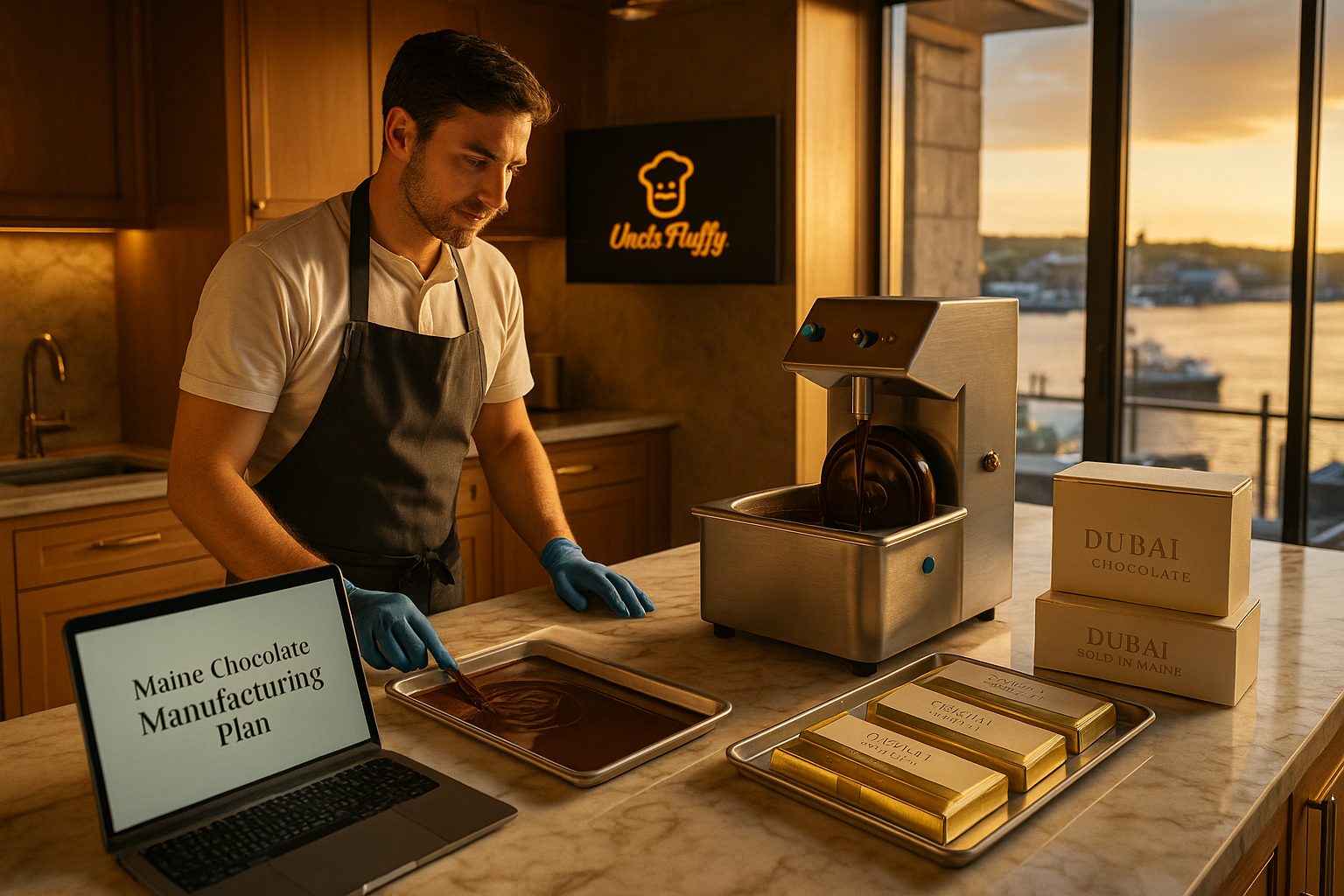Introduction
Maine has quietly become one of the most exciting places in New England for artisanal and luxury chocolate production. From boutique bean-to-bar makers to coastal confectioneries, Maine’s thriving food scene and strong tourism economy create fertile ground for chocolate manufacturers.
If you’re dreaming of launching your own chocolate manufacturing business in Maine, this guide will walk you through every step — from setting up your kitchen to getting licensed. You’ll also discover how you can skip the hardest parts of production and start selling immediately using the Dubai Chocolate Startup Package by Uncle Fluffy, a ready-made luxury dessert business model with international appeal.
1. Understanding the Chocolate Manufacturing Market in Maine
Maine’s chocolate market thrives on three key factors:
- Tourism: Millions of annual visitors create high demand for premium chocolates and gift items.
- Artisan culture: Maine residents value handcrafted, ethical, and locally inspired goods.
- Retail diversity: From small coastal shops to urban cafés, chocolate fits into multiple sales channels.
However, manufacturing chocolate in Maine requires careful planning, licensing, and product consistency — which is why many new entrepreneurs choose hybrid models that combine local sales with imported, ready-to-sell luxury products like Dubai Chocolate.
2. Decide What Type of Chocolate Business You Want
Before you start, define your manufacturing scope.
|
Model |
Description |
Investment Range |
|
Home-Based Chocolate Maker |
Small batches, handmade truffles or bars |
$5K–$20K |
|
Commercial Factory Setup |
Full-scale bean-to-bar operation |
$100K–$500K |
|
Private Label Partnership |
Partner with an existing manufacturer |
$20K–$60K |
|
Dubai Chocolate Startup Package |
Ready-to-sell branded luxury products |
$60K–$120K |
If your goal is to build a premium chocolate brand without building a factory, the Dubai Chocolate model eliminates costly setup while giving you high-quality, ready-to-brand products manufactured under world-class conditions.
3. Learn the Chocolate Manufacturing Process
If you plan to produce locally, here’s the simplified process for chocolate manufacturing:
1. Sourcing Cocoa Beans
o Import raw cacao beans from certified suppliers (e.g., Ecuador, Ghana, or the Dominican Republic).
o Maine’s ports allow direct import logistics via Boston or Portland.
2. Roasting
o Roast beans at 120–160°C to develop flavor.
o Equipment: drum roaster or convection oven.
3. Cracking & Winnowing
o Separate the outer shell from cacao nibs using a winnower or small-scale machine.
4. Grinding & Refining
o Use a melanger or conche to grind nibs into chocolate liquor (refined cocoa paste).
5. Mixing Ingredients
o Combine cocoa liquor with sugar, milk powder, and cocoa butter.
o For high-end chocolate, maintain exact ratios (60–70% cocoa solids).
6. Conching & Tempering
o Conching smooths the texture; tempering stabilizes the cocoa butter crystals for a glossy finish.
7. Molding & Cooling
o Pour chocolate into molds, cool, and package attractively.
💡 Tip: Even local manufacturers often outsource packaging to FDA-certified partners for compliance and design quality — a service automatically included in the Dubai Chocolate Startup Package.
4. Get Licensed to Manufacture Chocolate in Maine
To legally produce or sell chocolate, you’ll need state and federal approvals.
Required Licenses:
- Retail Food License: From Maine Department of Health and Human Services (DHHS).
- Commercial Kitchen Certification: Required for food production beyond home kitchens.
- FDA Food Facility Registration: For interstate chocolate distribution.
- Sales Tax Registration: With Maine Revenue Services.
For home-based producers, the Maine Cottage Food Law allows limited direct sales of non-perishable items, but chocolates with fillings or dairy must be made in a certified facility.
✅ Simplified Path: With Dubai Chocolate, manufacturing is already handled in Dubai’s HACCP- and ISO-certified factories, and all products arrive FDA-approved — allowing you to sell instantly with just a Retail Food License.
5. Find Equipment and Ingredients
If manufacturing locally, you’ll need professional-grade tools to ensure consistency and safety.
Basic Chocolate Manufacturing Equipment:
- Cocoa bean roaster
- Cracker and winnower
- Melanger/conche (for grinding)
- Tempering machine
- Cooling tunnel or fridge
- Stainless steel tables & molds
- Packaging heat sealer
Ingredient Suppliers in the U.S.:
- Barry Callebaut
- Guittard
- Blommer Chocolate
- Meridian Cacao Co.
However, with Dubai Chocolate, you bypass equipment and sourcing — your bars are pre-manufactured and delivered with luxury packaging, barcodes, and global compliance.
6. Packaging and Branding
Packaging determines your product’s market position. In Maine, minimalist, eco-friendly designs appeal to local consumers — while tourists prefer visually luxurious, gift-worthy packaging.
For local production:
- Use recyclable foils, biodegradable wrappers, and printed boxes.
- Include nutrition facts, ingredients, and net weight.
For Dubai Chocolate:
- Every bar arrives pre-packed in gold-accented boxes, bilingual (English-Arabic) labels, and GS1 barcodes — ready for premium retail or Shopify listings.
This level of packaging elegance is difficult for small producers to achieve alone, making the Dubai Chocolate Startup Package a smart branding shortcut.
7. Marketing and Selling Chocolate in Maine
Once your chocolates are ready, focus on visibility and storytelling.
Effective Sales Channels:
- Farmers’ markets and fairs: Local connection and direct customer feedback.
- Boutiques and gift shops: Sell premium Dubai Chocolate bars as luxury souvenirs.
- Hotels & Airbnbs: Offer custom chocolate boxes as welcome gifts.
- Online store: Sell via Shopify (included in the Dubai Chocolate package).
- Corporate gifting: Partner with Maine companies for branded chocolate boxes.
Marketing Strategies:
- Highlight “Dubai Luxury meets Maine Craftsmanship.”
- Use influencer partnerships and food bloggers.
- Promote sustainable sourcing and global quality certifications.
8. Estimated Cost Breakdown
|
Category |
Estimated Cost |
Notes |
|
Equipment |
$20K–$60K |
If producing locally |
|
Licenses & Permits |
$500–$1,000 |
Maine DHHS + FDA |
|
Ingredients |
$10K–$30K |
Initial supply |
|
Packaging Design |
$2K–$5K |
Local or outsourced |
|
Marketing |
$2K–$5K |
Branding & digital ads |
|
Dubai Chocolate Startup Package |
$60K–$120K |
Complete turnkey solution (no equipment needed) |
9. Profitability and ROI
Maine’s chocolate margins are strong, especially for luxury or gift products.
Typical Profit Margins:
- Local handmade chocolate: 25–35%
- Industrial-scale chocolate: 30–40%
- Dubai Chocolate Retail: 35–50%
With Dubai Chocolate’s ready-to-sell products, most partners recover their investment in 6–10 months.
10. Advantages of the Dubai Chocolate Manufacturing Model
|
Feature |
Traditional Manufacturing |
Dubai Chocolate by Uncle Fluffy |
|
Factory Setup |
Required |
✅ Pre-manufactured |
|
Packaging |
Self-sourced |
✅ Gold-accented, ready to sell |
|
FDA & Compliance |
Must apply |
✅ Already approved |
|
Supply Chain |
Complex |
✅ Streamlined Dubai-to-U.S. |
|
Profit Margin |
25–35% |
✅ 35–50% |
|
Launch Time |
12–18 months |
✅ 6–8 weeks |
Dubai Chocolate allows entrepreneurs in Maine to enter the chocolate industry instantly — without factories, recipes, or heavy regulations — while still offering the sophistication of a world-class brand.
Final Thoughts
Manufacturing chocolate in Maine can be an exciting and profitable venture — but it requires time, capital, and technical expertise. For entrepreneurs who want faster results, the Dubai Chocolate Startup Package by Uncle Fluffy delivers everything: luxury branding, FDA-approved products, and a scalable business model designed for both online and retail success.
Whether you’re setting up a chocolate kitchen in Portland or opening a luxury dessert kiosk in Freeport, Dubai Chocolate is your shortcut to global-level success.
“Why build a factory when you can build a brand? Bring Dubai’s luxury to Maine’s craftsmanship.” — Alaa Mohra
FAQs
Q1: Do I need FDA approval to make chocolate in Maine?
Yes — if you plan to sell across state lines. Dubai Chocolate products already come FDA-approved.
Q2: Can I start chocolate manufacturing from home?
Yes, under Maine’s Cottage Food Law, but only for certain non-dairy products.
Q3: What’s the fastest way to start selling chocolate in Maine?
Join the Dubai Chocolate Startup Package — it allows you to start selling within 6–8 weeks.
Q4: How much investment is needed for a factory setup?
A small commercial setup starts around $100,000; Dubai Chocolate requires about $60,000.
Q5: Can I customize Dubai Chocolate packaging?
Yes — you can add your logo or local branding while keeping the global Dubai Chocolate identity.
Start Your Own Dubai Chocolate Business >
We can help you:
We can ship to you everything you need to start your own Dubai Chocolate business in 30 days, a complete business-in-a-box that gives you everything to launch instantly: recipes, equipment, branding, packaging, training, suppliers, and marketing support. It’s a proven viral product tied to Dubai’s prestige, designed to cut risk, save time, and let you own a ready-made business with global appeal.
Contact us now



